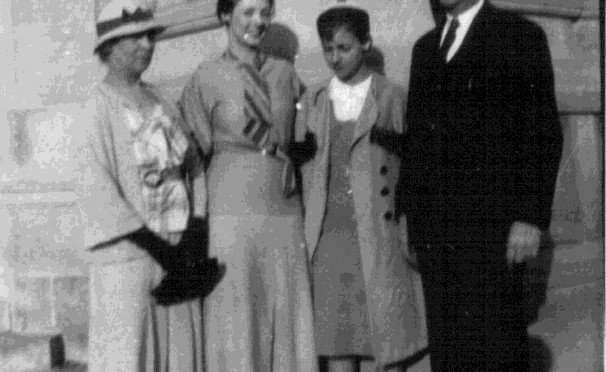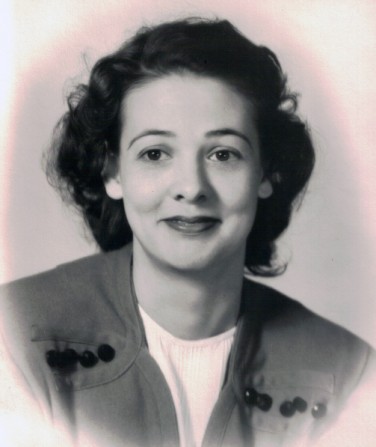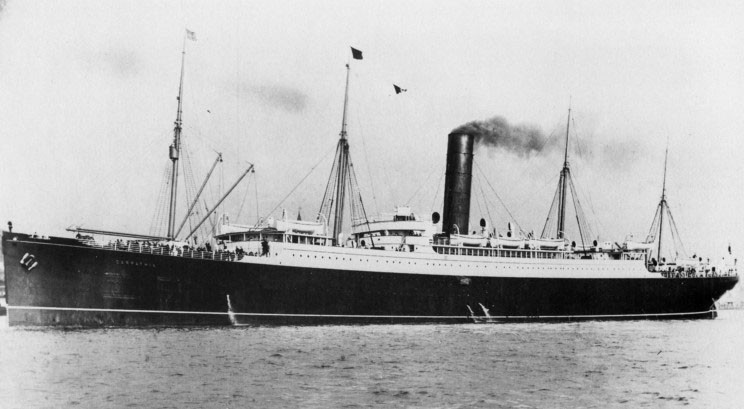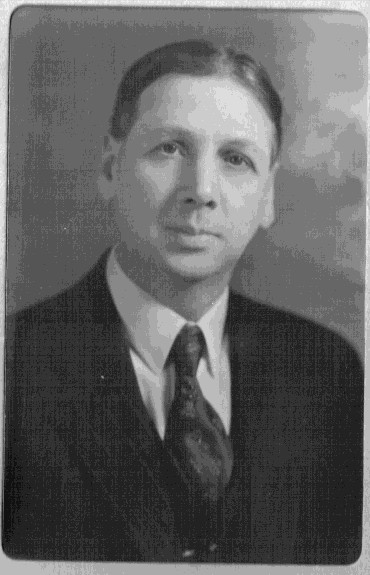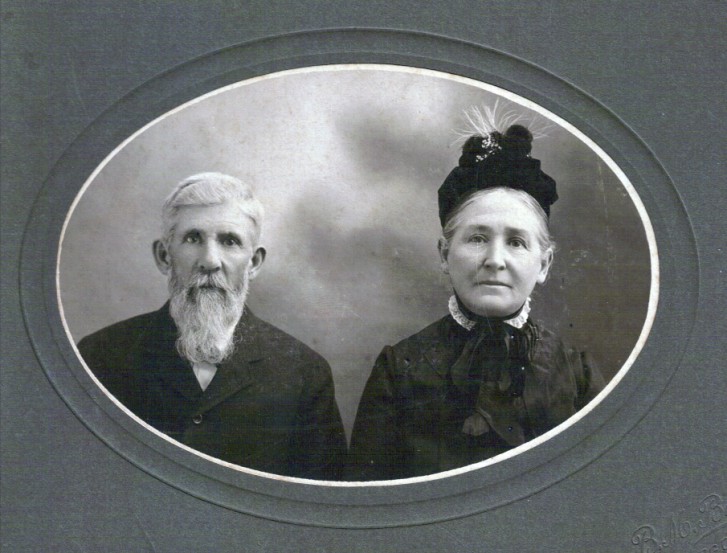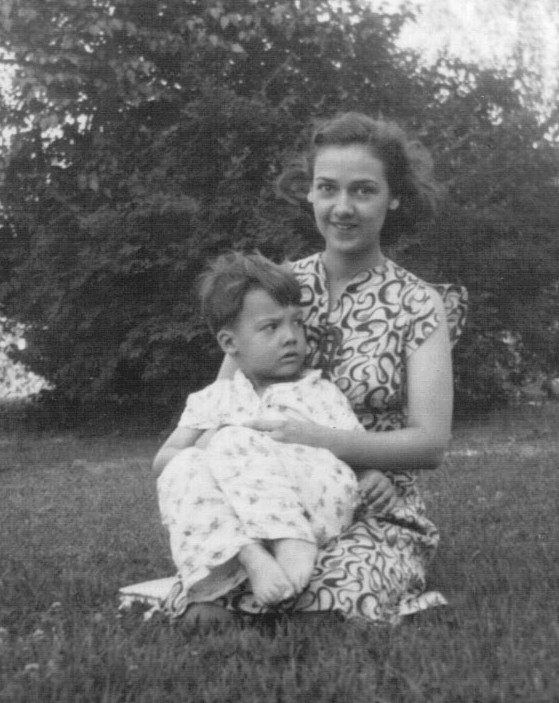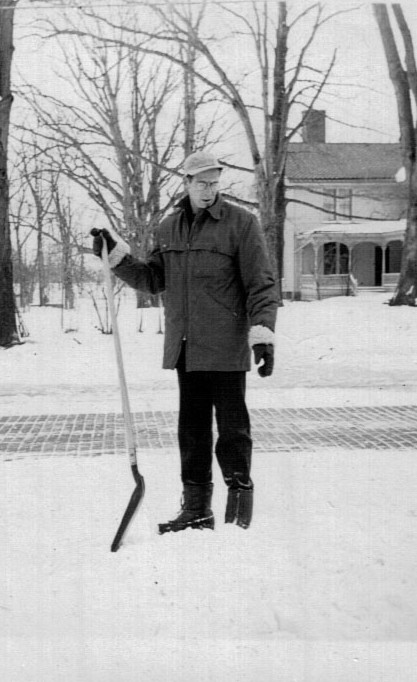Chapter 6, the Tearles
By Bob Chancellor
Frances Marie Tearle was born October 20, 1913, in Carthage, Missouri, but her family moved away from Carthage when she was a baby, going to Chicago. Thirty years later, she would return to the vicinity of Carthage for the first time when our family moved to Webb City, just ten miles away. Frances always talked fondly of her early childhood in Chicago – particularly the beaches along Lake Michigan. Her father was head of the copy writing department for the Dry Goods Economist. The family then moved to Boonville which she really considered her home town.
Mother went through elementary and high school in Boonville, and for two years, attended Christian College, an all girls junior college, in Columbia. I know that at Christian, she was interested in mod-ern dance, because one time Life Magazine did a photo feature about those dancers and she was among them. After college, for a time, she worked at the Boonville Daily News as a secretary and typist. She told me one of her main jobs was to take dictation daily from the Associated Press, which would call with a summary of the state and national news. Apparently the Daily News did not have a teletype machine. She was a pretty girl and a pretty woman. Everyone who knew Frances was struck by how sweet and gentle she was.
Her father was Arthur Tearle, a dry goods merchant, was born in Stanbridge, Bedforshire, England in October, 1881. He immigrated to the United States at the age of 22, arriving at Ellis Island, aboard the ship Carpathia, on June 10, 1904. (The steamship Carpathia would later gain fame when it rescued 705 survivors of the Titanic in April, 1912, and later again when it was torpedoed and sunk by a German submarine in 1918).
He listed his occupation as a draper. I remember my mother saying that for a time he worked at a hospital, where he saw and cared for drunks, reinforcing his aversion to alcohol. Phoebe, her younger sister, is not aware of this story. Anyway, so far as is known, he never drank liquor and both he and his wife were strongly opposed to it. He listed his destination as Kansas.
After finishing public schools, he had become an apprentice in the dry good business in England, holding posts in London, Northampton and Reading. He decided to come to the U.S. while doing social settlement work in Northampton, when he met a couple, whose wife had lived in the U.S. He worked at a dry goods store in Fairfield, Iowa, and then attended Koster Window Trimming and Advertis-ing School in Chicago.
He became window trimmer and publicity man for the Rush Store in Cherryvale, Kansas, where he met Louise Nunnelly.
A Cherryvale newspaper article in 1910 states: Arthur Tearle made a little trip to Independence (Kansas) this morning, returning with two very important documents. One was his marriage license and the other was the proof that he is now a full fledged citizen of the United States. Mr. Tearle came to the United States six years ago. This morning he foreswore allegiance to the new King George by taking out naturalization papers. Not quite true that he became “a full fledged citizen,” this was his original naturalization application, and precedes his Certificate of Naturalization by the required five years.
They were married May 18, 1910. Another article in the Cherryvale Daily Journal, notes Miss Nunnelly had had a short residence in Cherryvale, coming after the Christmas holidays as a special supervisor of music in the public schools
“Mr. Tearle,” the newspaper said, “is also an im-portant factor in musical circles, possessing a cultivated tenor voice. He has made himself very popular in Cherryvale as well as proved himself a successful young business man.”
He became a naturalized American citizen on June 14, 1915. The naturalization certificate by the U.S. District Court at Joplin, Jasper County, Missouri, shows he was married at the time to Mary Louise Tearle, whose address was 1136 Maple Street, Carthage, Missouri; and had a minor child, Frances Marie Tearle, of the home. Judging from this time table, he was still a British citizen at the time of my mother’s birth.

Arthur Tearle and baby Frances in Carthage
From Chicago, the family had moved to Missouri, where he was in charge of advertising for the Chasnoff stores of Sedalia, Warrensburg and Boonville. In 1922, he became manager of Chasnoff’s Boonville store and became its owner in 1927, doing business as the Tearle Dry Goods Store on Main Street.
From the History of Cooper County, by E.J. Mel-ton, 1937: “From early boyhood he sang in choirs, first of the State church in England, and then in his adopted country. He was director of the Presbyterian choir in Boonville, a deacon in the church and active in the Knights of Pythias lodge. (According to Phoebe, her mother also was a member of the choir and they often sang duets. He also had been the choir director of the Broad-way Presbyterian Church in Sedalia.)
At the time of his death (of a heart attack, at age 55) in January, 1936, he was a member of the Boonville Chamber of Commerce and was hon-ored by a resolution of that organization. He died fourteen days before my birth –that fact led to my fascination in researching his history, thus the length of this chapter. And you will notice, I carry his surname as my middle name. “Tearle” is a very unusual name both in this country and in England – his obituary said he was survived by four sisters in England and was the youngest of a large family. I have seen reference to three brothers, who are not mentioned in any of his family history. If they existed (and his daughter Phoebe has no knowledge of them) then they must have pre-deceased him. With no (surviving) brothers or uncles, there was no one to carry the name forward, except me.
In an article in the History of Cooper County, written some time after his death, Arthur Tearle was described as quiet and self-effacing, “but his idealism, steadfast character and thorough capaci-ties put him in a position of leadership.”
In an interview with the writer of the Cooper County History article, in December, 1934, Arthur Tearle reminisced about Christmas in England and said he would enjoy a visit. “However, I know I would find things different over there. Time and change bring disillusionment when one returns to old haunts. A short stay, I am sure, would forever cure recurring homesickness for scenes of my boy-hood. There is greater opportunity here than in England and I love the country of my adoption.” He never returned to England.
I knew my maternal grandmother, Mary Louise Nunnelly Tearle better than any of my other grandparents. In fact, I lived with her for part of ayear, in 1955. Her full name was Mary Louise, but she apparently always just went by Louise. She was born September 27, 1883 at Danville, in Montgomery County, Missouri. Her parents were John Theophilus Nunnelly, born in 1837, and Mary Frances Bush, born in 1842. Louise was the youngest of seven children, and I remember her talking about her sisters, Eva, Ora and Gertrude, and brother, Guy. There was another brother, Lu-ther, and a sister, Birdella, who died at the age of three.
Mr. Nunnelly was a mill operator and implement dealer in Montgomery City, where Grandmother Tearle went to school, but she never talked about her life as a girl. She next appears in my records in Cherryvale, Kansas, as a music teacher and fiancée of Arthur Tearle. She, of course, moved with her husband to Carthage, Chicago, Sedalia and to Boonville, where she raised her family. The Tearles lived in a two story brick house high atop a hill at the south end of Main Street. The house is still there – my mother told of the car run-ning out of gas and being able to coast all the way down the Main Street hill to a service station to refill the tank.
My aunt Phoebe was born October 15, 1920 in Sedalia and was in high school in Boonville when her father died. Louise had worked in the store alongside her husband on occasion, but neither Frances nor Phoebe ever worked there. Upon Arthur Tearle’s death, Mr. Malone, a rival merchant who apparently had some investment in the Tearle store, took over the store and closed it. Phoebe remembers “it was not a pleasant situation and it upset mother greatly.” Another competitor, Mr. Koppel, was described by Phoebe as being a lot of help after Arthur died, and offered Louise the job of running his store, the Sunny Day, a dress shop. Being the widow of a successful Boonville merchant apparently had not left Louise and Phoebe too well off.
About four years later, in 1940, Louise and Phoebe moved to Kansas City where grandmother went to work at Emory Bird Thayer, in the linen department, and Phoebe says she enjoyed that job very much. She worked there nearly 20 years. Phoebe recalls they moved to Kansas City because Phoebe wanted to attend the Edna Marie Dunn School of Fashion Illustration and De-sign. “Mother didn’t want me to go to K.C. by myself and she had no reason to stay in Boonville, so we moved. I’ve always felt bad about that because she had such nice friends in Boonville. I think her life would have been much more pleasant there than in Kansas City.”
In Kansas City, Grandmother Tearle can best be described as “indomitable and energetic.” She was short, buxom and had white hair, which had turned at an early age. She never had a car, but walked long distances – often the 30 or so blocks to work – and rode public transit to work and to shop, always wearing a hat and little red gloves. She always lived in apartments, first near the Country Club Plaza and later on Armour Blvd. To my knowledge, she never had a boyfriend, nor any interest in re-marriage although she did tell me she had had opportunities. When she retired from the store, she stayed on in her apartment until dementia forced Mother and Phoebe to place her in a nursing home. She died in July, 1968, at the age of 85. At the time we were living in Thailand and unable to attend her funeral.
Phoebe, who was an accomplished artist, also worked at Emory Bird Thayer in the advertising department after finishing the Dunn school. Then she got a job at Trans World Air-lines in the advertising department but was put in the reservations de-partment “to get a feel for the airline.” She liked that so much that she just stayed in reservations from 1943 to 1946. While working there, she met Marshal S. Ken-nedy, a college roommate of her boss. They were married in September, 1946, in Buffalo, New York, and live two years in Youngstown, New York, on the banks of the Niagara River where it flows into Lake Ontario. There they spent a lot of time sailing on his parent’s 28 foot boat.
Marsh Kennedy worked for a time with TWA, and then with Bell Aircraft Company. I remem-ber when I first met him, he gave me some Bell Co. pictures of the XS-1 experimental rocket-powered airplane, which was a Bell project. To me, he was an exciting creature, who drove an MG sports car. Their first daughter, Laura, was born in Youngstown, May 3, 1948. Then they moved back to Kansas City, where Marsh worked for the Bendix Aviation Corporation. The com-pany was a prime contractor to the Atomic Energy Commission, and while Marsh could not talk much about his job, he did travel frequently to New Mexico to observe nuclear bomb tests.
They lived at Lake Quivira, west of Kansas City, from 1951 to 1965, and their second daughter, Kristin, was born August 23, 1951. In 1965, the family moved to Jacksonville, Florida, where Marsh worked for Mason, Hanger, Silas, Mason engineering company until his death July 11, 1967. Phoebe and the girls moved back to Kansas City in 1968, and not too long afterward, Phoebe married Arthur C. Popham, a successful lawyer and member of a prestigious Kansas City family.
Art, like Marsh, was a flamboyant character – he had done a lot of big game hunting and had a house full of African trophies, as well as several dioramas of his animals at the Kansas City Museum. He, too, was a car aficionado, having been the owner of a Cord in his younger days. He died September 23, 2009 at the age of 94.
Phoebe’s eldest daughter, Laura, married and since divorced a journalist, Richard Olive, in 1977, and they had one son, Andrew Kennedy Olive, born November 17, 1980. Laura died in San Francisco on September 16, 2002.
Kristin married Larry Bowen in Houston on June 30, 1984, and they had two children, Marshall Thibideaux Bowen, born September 28; 1985 in Kansas City, and Marguerite (Maggie) Louise Bo-wen, born October 11, 1988. She was named after Louise Tearle. Larry, a master professional chef, died June 24, 2009.
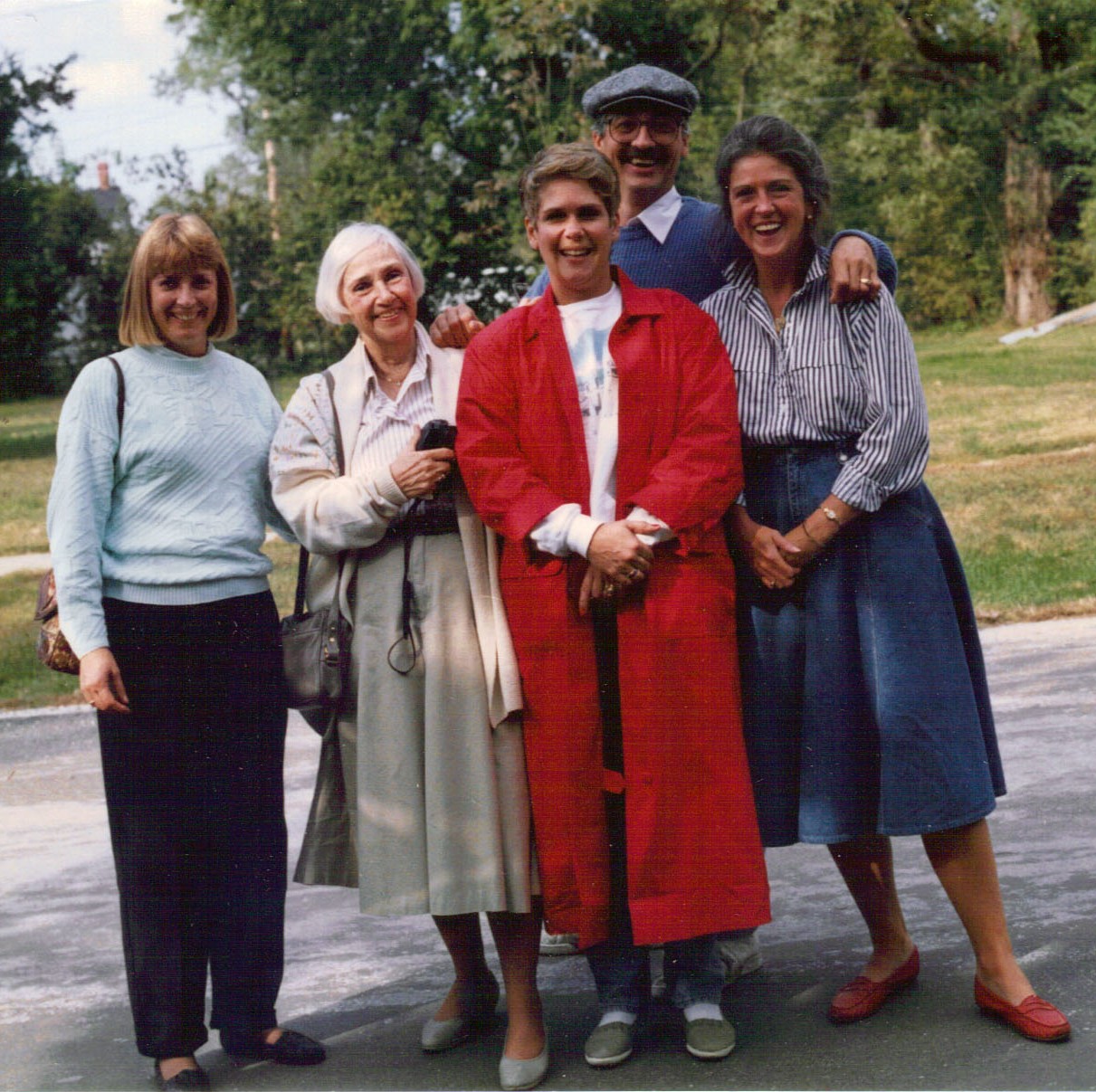
Boonville was revisited in 1990 by my aunt Phoebe, (second from left) when she took my brother Steve, his wife Kay (at left) and her daughters Kristin (in front) and Laura (at right) on a tour of her old home town.
To read the rest of “Pieces of String to short to Save” by Bob Chancellor, you can buy the book here
The promo for the book to give you more information on it is here: Book Promo
